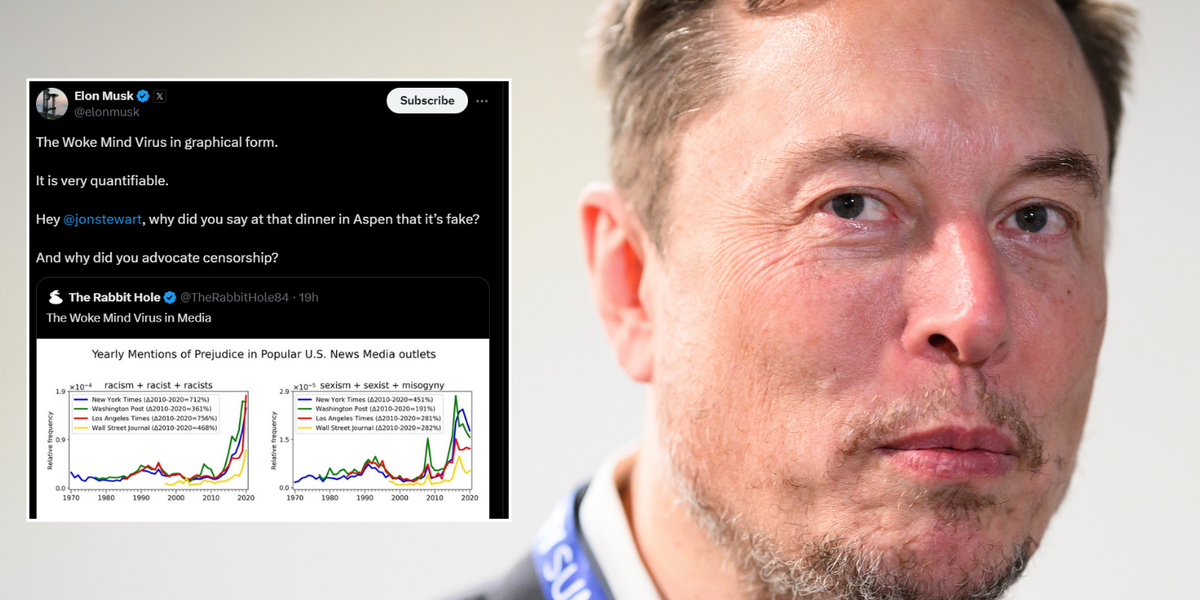Decoding The 'Woke Mind Virus': What You Need To Know Now
Is there a silent epidemic spreading across our society, subtly altering perspectives and influencing decisions? Many believe there is, labeling it the "woke mind virus," a term that has ignited fierce debate and captured the attention of figures like Elon Musk and Ron DeSantis.
The term "woke mind virus" has rapidly permeated public discourse, often used to describe what critics perceive as an excessive embrace of progressive ideologies. While its exact definition remains nebulous, it typically refers to the adoption of viewpoints that prioritize social justice, inclusivity, and awareness of systemic inequalities. This concept has become a focal point in discussions about culture, politics, and even the future of artificial intelligence.
| Aspect | Details |
|---|---|
| Origin of the Term | Popularized by Elon Musk, who has used it in various contexts, including criticism of Netflix's content and concerns about AI programming. |
| Core Concept | Critics perceive it as the imposition of progressive ideologies, particularly concerning race, gender, and social justice, potentially leading to groupthink and intolerance of differing views. |
| Political Implications | Influences political platforms, with candidates adopting progressive stances to appeal to younger, socially conscious voters. Florida Governor Ron DeSantis has actively campaigned against "woke" policies. |
| Role of Social Media | Social media platforms are seen as key amplifiers of the "woke mind virus," facilitating the rapid spread of related ideas and discussions. |
| Criticisms and Counterarguments | Challenged as a rhetorical strategy to undermine progressive viewpoints, rather than a genuine threat. Some argue that focusing on the "woke mind virus" distracts from more pressing issues like government corruption and social injustices. |
| Elon Musk's Concerns | Musk has expressed concerns about the "woke mind virus" being programmed into AI, viewing it as a significant existential threat to humanity. He has also linked it to his daughter's gender transition and his criticism of "destructive medical interventions." |
| Reference Link | Example Website |
Elon Musk, the billionaire CEO of Tesla and SpaceX, is arguably the most prominent figure associated with the term. He has repeatedly voiced his concerns about the "woke mind virus," using it to critique various aspects of contemporary society. In 2022, Musk attributed Netflix's declining subscriber base to its "wokeness," tweeting that the "woke mind virus is making Netflix unwatchable." This statement sparked considerable debate, with some agreeing that the streaming service's focus on social issues had alienated viewers, while others defended its efforts to promote diversity and inclusion.
- The Enduring Legacy Of Sam Heughan The Beloved Jamie Fraser Of Outlander
- Tracing The Intriguing Relationship Between Park Bo Gum And Kim Yoo Jung
Musk's anxieties extend beyond the entertainment industry. He has warned that the "programming of the woke mind virus" into artificial intelligence poses a significant existential threat to humanity. His fear is that AI systems imbued with these ideologies could make decisions that are biased, unfair, or even harmful. This perspective highlights the growing unease surrounding the ethical implications of AI and the potential for algorithmic bias to perpetuate existing social inequalities.
The roots of Musk's concern, according to some sources, may be deeply personal. An aide suggested that his daughter Vivian's decision to transition from her birth gender served as a motivator for his vocal criticism of "wokeness." Musk himself has expressed concern over parental consent for gender-affirming procedures, viewing it as a consequence of being "infected by the woke mind virus." He sees it as a "sickness of the mind" that leads people away from "common sense" and towards "destructive medical interventions" in the name of healthcare. These comments have drawn sharp criticism from LGBTQ+ advocates and allies, who argue that they are harmful and perpetuate misinformation about transgender individuals and their healthcare.
Florida Governor Ron DeSantis has also embraced the term "woke" as a central theme in his political platform. He has repeatedly vowed to "fight the woke" in the legislature, using it as a rallying cry against policies he deems to be overly progressive. DeSantis's focus on "wokeness" aligns with a broader conservative strategy of appealing to voters who feel that traditional values are under attack and that progressive social movements have gone too far.
However, the concept of the "woke mind virus" is not without its detractors. Many argue that it is a deliberately misleading term used to delegitimize legitimate concerns about social justice and equality. Critics contend that it is a rhetorical strategy designed to undermine progressive viewpoints, rather than a genuine threat to society. They argue that labeling progressive ideas as a "virus" is a way of dismissing them without engaging in substantive debate.
Some observers suggest that the term "woke mind virus" simply describes groupthink, where individuals within a group adopt the same opinions without critically evaluating alternative perspectives. Others see it as a form of "mobbing," where a single person's view is targeted and attacked by a larger group. These interpretations highlight the potential for social pressure and conformity to stifle dissent and critical thinking, regardless of the specific ideology in question.
The role of social media in spreading the "woke mind virus" is a recurring theme in discussions about the term. Social media platforms are often seen as echo chambers where like-minded individuals reinforce each other's beliefs, creating a distorted perception of reality. The algorithms that govern these platforms can also contribute to the spread of misinformation and the amplification of extreme viewpoints. This has led to calls for greater regulation of social media companies and increased efforts to combat online disinformation.
It's important to recognize that the "woke mind virus" is not a universally accepted concept. Many people view it as a pejorative term used to denigrate those who advocate for social justice and equality. They argue that the real threats facing society are not progressive ideologies, but rather issues like government corruption, economic inequality, and systemic discrimination. These individuals believe that focusing on the "woke mind virus" distracts from more pressing concerns and perpetuates a culture of division and intolerance.
To understand the context of Elon Musk's use of the term, it's helpful to consider his background in technology and his penchant for using analogies drawn from computer science. Two years prior to his initial tweets about the "woke mind virus," Musk tweeted "traceroute woke_mind_virus." In computer programming, "traceroute" is a command used to trace the path of information and identify its source. This suggests that Musk views "wokeness" as something that can be traced back to a specific origin or set of influences. This perspective challenges the validity of the claim by framing it as a rhetorical strategy rather, in reality it is more complicated.
Ultimately, the "woke mind virus" is a complex and controversial term that reflects deep divisions in contemporary society. Whether it is viewed as a genuine threat or a misleading label, it has become a powerful symbol in the ongoing culture wars. Understanding the different perspectives surrounding this term is essential for engaging in constructive dialogue and finding common ground on the issues that divide us.
The debate surrounding the "woke mind virus" also raises questions about the nature of belief and the potential for ideology to shape our perceptions of the world. Some argue that "wokeness" can alter the way we think and reason, leading us to embrace certain ideas and reject others without critical evaluation. This raises concerns about the potential for indoctrination and the erosion of independent thought. Thus, if true, this means wokeness itself reshapes the mind.
However, others argue that "wokeness" is simply a heightened awareness of social injustices that have long been ignored. They believe that it encourages empathy, compassion, and a commitment to creating a more just and equitable society. From this perspective, "wokeness" is not a virus but rather a necessary antidote to the biases and prejudices that have historically plagued our society. While a trait in itself, it is related to number 2.
The term "woke mind virus" is, therefore, not just a descriptor but a battleground. It encapsulates the anxieties and aspirations of a society grappling with rapid social and technological change. Its continued use and evolution will likely reflect the ongoing struggles to define the values and principles that will shape our future.
One thing is certain: the debate surrounding the "woke mind virus" is far from over. As long as there are differing views on social justice, equality, and the role of ideology in society, this term will continue to be a subject of intense discussion and debate. It even has a name:
The "woke mind virus," as Tesla founder and Twitter CEO Elon Musk detailed in an interview Friday on HBO's Real Time with Bill Maher. I know that "woke mind virus" is a term of art for the (condescending and misguided) idea that progressive views on race and gender are an outside contagion threatening the minds of young. We should be worried about corruption in our government and the injustices that Americans face every day at the hands of our leaders. The "woke mind virus" is not what our country needs to be worried about.
- An Epic Journey Through Led Zeppelins Kashmir A Timeless Masterpiece
- Hear Lainy Wilsons Refreshing Sonic Drink Collaboration

JubaCicero on Twitter " WSBChairman Here are the top 21 signs and

Elon Musk highlights the 'woke mind virus' in six shocking graphs

Why Elon Musk Won’t Stop Talking About a ‘Woke Mind Virus’ WSJ